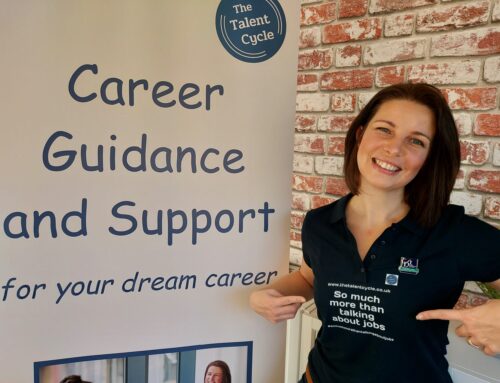As with many things in schools, gaining the Quality in Careers Standard takes a lot of work, but I would argue that it is totally worth it.
I’m an assistant headteacher at John Hanson Secondary School in Andover. A few years ago I was given the responsibility of curriculum planning for both Personal Social and Health Education (PSHE) and Careers, Enterprise and Finance. When I took this on, I quickly realised that we were in a very good position to get accredited for the careers award as we already offered so much to our students with regards to CEIAG.
With a brilliant careers advisor working at the school, and a successful careers programme that included organising and hosting an annual career fair for almost a thousand Year 11 students, I felt we were in the perfect position to be the first school in the Test Valley area to be accredited by Investors in Careers. Their award recognises excellent careers education and guidance across schools in the UK. In 2019, we were awarded the Quality in Careers Standard and praised for our holistic approach to careers education. We continue to hold the award to this date. In this article, I share my top tips for gaining and maintaining the careers award in your school.

- Do your research
The first thing I’d recommend for anyone thinking about gaining accreditation is not to go into it lightly. The process is time consuming, so the most important thing is to research the different careers awards that are out there, find out what funding is available and then decide which one is right for your setting. We were lucky as the one I wanted to do came fully funded.
- Visit another school and go digital
Early on, our coordinator at the award provider introduced us to another school who allowed us to visit their careers leader to get advice. He had already been accredited and was working towards being reassessed. The best piece of advice from him was to maintain an electronic portfolio rather than a paper based one. Many of us are used to paper portfolios from the days of PGSE and NQT folders, but most careers award companies offer both options. Given the availability and ease of things such as the Compass tool (and now Compass Plus) for tracking careers, from experience, it is so much more efficient to use an electronic portfolio. Having an admin team working with you also really helps. I’ve learned the hard way that saving up all your evidence to log and doing it all in one go is massively time consuming. It is so much easier to log it as you go, both before the assessment and after.
Equally by going digital, we’ve been able to better map our curriculum alongside the National Learning outcomes – something our assessor recommended we do and we’ve acted upon this advice.
- Get SLT on board
As an assistant headteacher and the school careers leader, I was in the perfect position to gain accreditation quickly without the need to run things by the leadership team. If your careers leader isn’t SLT then they will need regular meetings with them to get decisions made. Obtaining the backing of the governors is also helpful in making decisions and moving through the stages of the award efficiently. Setting yourself achievable targets and deadlines really helps with getting your head around the workload.
- Forge strong links
The thing that makes our careers provision so successful here at John Hanson is the links we’ve forged with local employers and education and apprenticeship providers. We maintain a spreadsheet with post-16 and post-18 providers nearby, as well as training providers and apprenticeships. These people come in for assemblies, PSHE off-timetable days, lunch time drops-ins, parents’ evenings and more. We also have over two hundred local employers listed who provide us with everything from careers talks and workshops to work experience placements. We are constantly looking for more, and asking for support. Most say yes when asked, but I would say that it helps to say you’ll give them a mention on social media platforms, cover petrol / train costs, and offer refreshments!
- Be visible
This was a new one for us when I embarked on this role. We started a Twitter page @CareersJh (Instagram would work just as well), which was a fabulous way for us to make many employer links, as well as to showcase what we were doing. We also have a weekly newsletter on our website. This is emailed directly to parents with details of what we’re doing with regards to careers and how they can help. When it came to providing evidence for the award, these were great tools to showcase our careers provision.
- Help others
This has arguably been our biggest success with regards to careers. We are based in a small town with three other secondary schools and a selection of fee-paying and special schools nearby. Years ago, our careers fair was somewhat tired and lacked employer numbers. It tended to be the case that representatives from local companies only went to one careers fair at the school where they’d been a student themselves (they couldn’t go to them all due to time and resources). So, six years ago, we launched our annual careers fair inviting all Year 11 students from across the town to attend at various points during the day, alongside over sixty other providers and local employers. Over recent years this has grown significantly with well-known national employers attending too. Each year we also host a guest speaker who is an expert in the field. By opening up our doors to more schools and their students, we’ve enabled the Careers Fair to be a better opportunity for all. Employers will see many students across the day, and students likewise benefit with access to more providers.
- Get alumni and parents onboard
Collating an alumni network is a sure-fire way of gaining support for the careers provision in school as students love to hear about ex-students and what they’re doing. It also means they can hear about a variety of career areas from young people – not their teachers! Parents have been keen to support this over the years too, as they’ve been happy to drop in for informal careers talks with our students. We’ve begun to plan for this by ensuring all of our outgoing Year 11s leave us with an up to date email address, and give consent for us to contact them later, so we can get them back in to help a few years down the line.
When we gained our accreditation, they said in the report: “As part of the process, John Hanson have built a detailed programme of events… further highlighting their prominent status in careers guidance.” For me, this cemented what I already knew about our careers provision.
We’re honest with ourselves about what we can and cannot offer. During Covid-19 and the lockdowns we’ve done what we can: celebrated National Careers Week and National Apprenticeship Day, ensured all our students had a 1-2-1 careers interview so they could make informed decisions about their post-16 options, and we’ve maintained support of our vulnerable students with plans in place to take our SEND students for trial visits to their college of choice on the transport they’ll use. These little details that we’ve prioritised this year are what made the difference for us when gaining the award, and continue to make the difference now.
We are known in the area as the school that takes every opportunity offered to us by training providers, the local college, universities and employers. But we do know when to say no if something isn’t quite going to work for our students. Equally, we think outside the box – a couple of years ago we took a minibus full of Year 9 students to a medical seminar as they were interested in careers in medicine. The tickets were pricey but we paid out of some funding we’d accessed and it was a huge success. Not only did our students hear from some excellent medics, but they sat next to Eton boys and gained from that experience too!
We were praised for our strong strategic and operational leadership of careers and our diverse and high quality CEIAG provision in our assessment. This is something we are extremely proud of.
Crucially, our assessor said we weren’t complacent. This I think is the key to maintaining the careers award. There is always something you can develop within your provision to ensure that student needs are fully met.

Anna Hall has been an assistant headteacher for 8 years, leading on professional development, quality of teaching and the personal development of students. She is Careers Leader at her school and, with the support of her team, secured the Careers Award in 2019.





